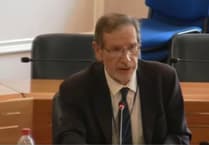One of the less visible aspects of my work in Parliament is serving on the Health and Social Care Select Committee. It’s a cross-party group where MPs from all sides come together to hold ministers and health bodies to account.
Each week, we take evidence from frontline staff, senior officials and patients – digging into issues that touch all our lives. One week it might be cancer waiting times, the next pharmacy access, children’s mental health, or social care reform. Whatever the subject, someone in our community – in Farnham, Bordon, Haslemere, Liphook or nearby – is likely living that experience and deserves a voice.
The discussions in committee rooms often reflect the conversations I have on doorsteps. I’ve lost count of the number of times a concern raised locally surfaces again during formal evidence. That’s how Parliament should work – not as a distant institution, but one that listens, reflects and acts.
Take adult social care. I understand the pressures in our area through my conversations with groups like Guardian Angel Carers, Phyllis Tuckwell, and CHD Living.
At Committee, we’ve examined why long-promised reforms have yet to materialise, despite growing strain on local services and families. I’ve pressed ministers on the widening gap between rhetoric and reality – a gap felt sharply by residents trying to navigate fragmented support across Hampshire and Surrey.
In our recent inquiry into community mental health, I argued for earlier intervention and easier access to care, drawing directly on conversations with local schools, GPs and parents.
Some scrutiny is more technical but just as vital. We’ve recently looked at proposals to abolish NHS England. I raised concerns about the impact on areas like ours, where services already stretch across three integrated care boards: Frimley, Surrey Heartlands, and Hampshire & Isle of Wight.
That fragmentation already makes coordination difficult for GPs, pharmacies and community providers. Our primary care networks have warned that more upheaval could make matters worse – a point I continue to press.
That same principle guides my work as a junior opposition whip, where I lead on health-related delegated legislation. These often-overlooked regulations shape the delivery of care – from who can practise to how prescriptions are priced. My job is to ensure these changes are properly scrutinised and don’t pass unnoticed.
Behind every question I ask in committee is a conversation I’ve had with someone locally. I’ll keep fighting for a healthcare system that works for our community – grounded in real experience, and driven by a determination to get things done.




Comments
This article has no comments yet. Be the first to leave a comment.